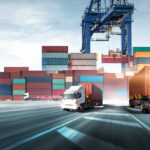Growth requires adoption of speedy reforms
Growth requires adoption of speedy reforms
While South Africa finds itself in a perilous position right now, all is not lost. Growth is possible – but only with speedy reforms, writes CHRIS HATTINGH.
According to the African Rail Industry Association, Transnet is anticipated to have moved between 155 and 160 million tonnes in the financial year ending 31 March 2023. In 2018, 226 million tonnes were moved. The 2023 figure, therefore, represents a decline of more than 30% from 2018 volumes.
Independent researcher and professor at Stellenbosch University, Jan Havenga, has estimated the loss to GDP of general freight at about 2%. Given the critical importance of mining and agriculture to the South African economy, and their reliance on rail freight, the general decline of the country’s trade infrastructure in rail and ports represents serious damage to the economy. Should the situation not be improved, even partially, crumbling infrastructure will act as another hard cap on growth and job creation, hand-in-hand with the electricity crisis.
It is reported that President Cyril Ramaphosa, in a meeting with key exporters on 5 April, proposed the establishment of a national logistics crisis committee. The apparent goal of said committee is to address the ailing performance of the country’s ports and rail networks. On the positive side of such a proposal, having better coordination between industry players and the state could ensure faster movement on reforms in the trade space. On the negative side, however, this committee could simply delay reforms, as more bureaucratic box-ticking will be needed. Moreover, considering fundamental ideology, government and its role players will want to ensure continued control of rail and ports for as long as they are able.
The meeting on 5 April followed a previous meeting reported on in the last week of March, at which Ramaphosa apparently directed Transnet executives to find and implement solutions for the ongoing problems afflicting trade and logistics. He made specific mention of the reform aimed at unlocking third-party access and operations on the country’s railway networks.
As I have previously written, it is one thing to call for third-party or private-sector access to the railways, but when such reform comes with the caveat that Transnet will remain custodian of current and new infrastructure, there is little reason to expect that substantial investment will flow.
Should Ramaphosa truly be concerned about the state of trade infrastructure, perhaps it would be more prudent to cut Transnet out of the picture. This raises the problem of ideology, though, with the governing party remaining committed to the idea that it needs to be intimately involved with, and decide the running of, various (if not most) aspects of the apparatus of government and the economy. This stance has so far driven much of the country’s trade infrastructure into a far below-optimal state, affecting both business and commuters across the board. At present, for example, passenger rail volumes are estimated to be more than 80% lower than in the latter years of the 2000s.
If we are truly concerned about creating an enabling, inclusive economy, we need to ensure that the very basics of government are functioning at an optimal level. In this case, reliable and cost-effective rail networks and transport would allow people to choose that option instead of being forced to rely on other forms of public transport that are more exposed to external factors such as rising oil and fuel prices.
Without tangible moves to break the Transnet monopoly, “crisis meetings” like the latest gathering convened by Ramaphosa with key exporters will remain mere talk shops. The pressure is also on those exporters who were in the room to hold government to task, not accept empty promises and delays, and walk away when they see government is not serious about implementing real reforms. South Africans cannot afford to wait any longer, as trade patterns are already shifting and those who do not move swiftly will be left behind, unable to take advantage in the future.
Globally, with tension between the US and China increasing and the effects of the Russian invasion of Ukraine continuing to permeate through supply and value chains, South Africa could benefit from increased trade and investment that forms part of “reshoring” or “friendshoring” on the part of Western countries. Even more importantly, the goals of the Africa Continental Free Trade Area will not be realised without trade infrastructure being maintained and upgraded. Such reforms can only take place if the state departs from a tendency that favours centralisation, and instead moves to do all it can to facilitate the investment, skills development, and job creation that the dynamism of a confident and welcomed private sector can provide.
Published by
Chris Hattingh
focusmagsa




